SWE’s Engineering Exploration Shows Middle School Girls: Women Can Be Engineers!
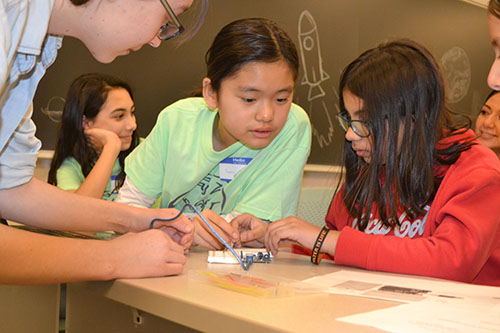
Engineering Exploration participants work on an Arduino during their Electrical/Computer Engineering activity.
March 5, 2020
The name of SWE’s new Engineering Exploration outreach pretty much sums up the event. The 40 or so mostly middle school girls who showed up for the February 22nd all-day event had a chance to explore the different engineering disciplines available; were exposed to women in engineering—from current students to practicing engineers; and discovered, while successfully completing the various hands-on activities, that they too could do engineering.
The event’s hands-on activities, based on the theme, “Engineering Around the World,” were held both in the morning and the afternoon, and introduced many of the engineering fields taught at Illinois. Led by members of the various professional societies from those disciplines, the activities, which follow, addressed a variety of engineering disciplines as well as countries where these types of engineering might be used.
- Aerospace Engineering. Members of Women in Aerospace led participants in the “American Moon Landers” activity, where young participants designed then tested a moon lander. Equipped with a parachute, their lander was then dropped from five feet to see if the payload (a cup of marshmallows) would safely land. Whether or not their marshmallows spilled out, the girls had loads of fun.
- Bioengineering. In the “Prosthetic Hand” activity, led by students in the Biomedical Engineering Society, participants built prosthetic hands using construction paper “hands,” straws, and yarn, then tested them by trying to pick up something.
- Chemical Engineering/Environmental Engineering. In the “Water Filtration Demo” activity, led by members of the American Institute of Chemical Engineers, students were to use coffee filters, charcoal, sand, or chemicals to filter and purify a cup of dirty water to make it safe to drink. (No one did, though.)
- Civil Engineering. In the “Build da’ Bridge” activity, led by members of the American Society of Civil Engineers, participants built a bridge using tongue depressors, tape, and wooden dowels. The test involved spanning the “bridge” across two bricks, while a third brick was placed on top of it to see how sturdy it was.
- Electrical Engineering/Computer Engineering. During “Sending Signals with Circuits,” led by Women in Electrical and Computer Engineering, youngsters explored the world of electromagnetic waves through infrared light. Working with Arduinos, they then tested them using a compuer program to send signals from an infrared emitter to a detector.
- Mechanical Engineering. In the “Slingshot Straw Rockets” activity led by Off-Road Illini Baja, young participants built straw rockets to learn how different materials and forces affect projectile motion and energy conservation.
- Nuclear Engineering. During the “Mousetrap Reactors” activity, taught by members of the American Nuclear Society, participants used mousetraps, ping-pong balls, Styrofoam balls, and toothpicks to understand and model nuclear reactions.
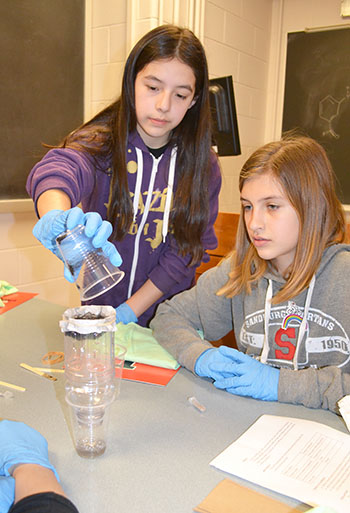
During Chemical Engineering's water filtration activity, event participants test their water purification system.
Regarding Engineering Exploration's emphasis addressing all of the disciplines, SWE Outreach Co-coordinator Kylie Burkett explains why. She and her fellow co-coordinator, Saloni Nagarkar, had seen a decline in attendance at SWE events over the last couple of years, thus they decided to make some changes. So they revamped their Engineering Round Robin event, renaming it Engineering Exploration to make it better describe what the event actually involves. They also eliminated the big design activity at the end, instead featuring engineering-discipline-related hands-on activities throughout the whole day.
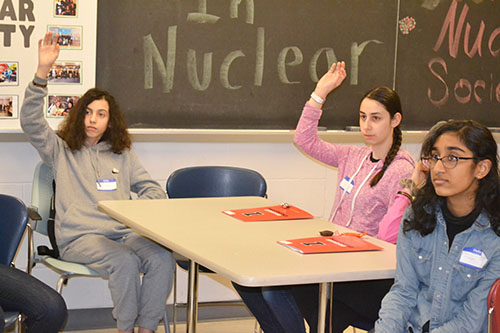
During the Nuclear Engineering session, students participate in a game about which of two items have more radiation, for intance, being 10 miles from a nuclear power plant or eating a banana. Surprisingly, it was eating a banana!
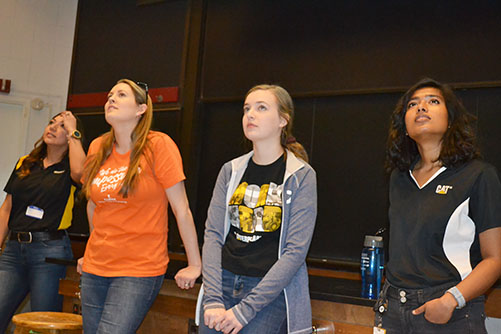
Practicing engineers Jessica Anderson, Amanda Martin, Jenna Kummerer, and Jessica Halder share with the audience of kids and parents about what it's like to be a female engineer working at Caterpillar.
Why? Based on feedback they’d gotten, middle-school girls, especially, reported finding activities that kept them engaged to be more interesting. So the idea was to expose them to a variety of activities from different disciplines. “So that was our main goal,” she says, “just to emphasize all disciplines and not just three or four.” Then, to advertise, SWE sent emails to contacts from previous events, and also contacted both local and Chicago middle schools that they had reached out to in the past. Around 40 girls responded, mostly middle school girls but also some high schoolers, and the majority showed up.
However, it wasn’t just middle schoolers who enjoyed activities during the event. Because of the positive influence parents can have on their daughters’ exploration of STEM, SWE leaders also reached out to parents. So, after dropping their girls off, about 30–35 parents stayed around for the various activities designed just for them, including a tour of engineering campus, plus presentations about college tracks, various engineering majors, and how to encourage STEM at home. Parents also joined their daughters for the pizza lunch featuring a panel by female engineers from Caterpillar.
The panel was comprised of four current female engineers who work at Caterpillar, a couple of whom had graduated from Illinois, and one who is due to graduate this spring. The idea behind the panel was to share with both the students and their parents what being a female engineer is like, to offer advice, and to answer questions. For instance, one question dealt with supports available on campus which specifically target girls. Another question was related to what working at Caterpillar is like, as panel members were asked to touch on some accomplishment, something they’ve achieved, or a project they’ve worked on at Caterpillar.
One panel member shared how, as an intern, she had been asked to design handrails for a truck staircase and had spent 20 iterations just getting it right. Then to remember and celebrate her achievement, she had a miniature of it 3D printed. “And I put a magnet on it; I put it on my fridge now just so I can look at it and be like, ‘This is mine!’ To have that sense of satisfaction. I was really excited.”
Finally, the panelists shared pieces of advice for the young students (and parents). One engineer, after describing how she’d changed career plans from medicine, to neuroscience, to being a violinist for the Chicago Symphony Orchestra, to bioengineering, to agricultural engineering, and finally, to Caterpillar, told the audience this: “So my point is, it's okay to have diverse interests. It's okay to not know what you want to do right now, because you'll figure it out eventually. You will try so many things. You'll realize what you like.”
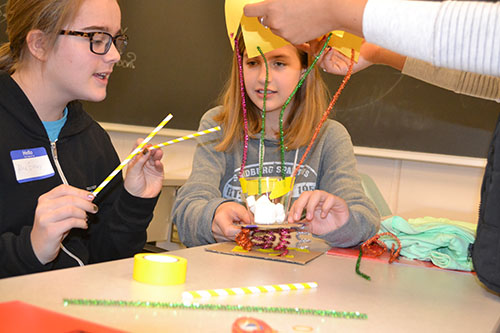
Participants create a moon lander during the Aerospace Engineering hands-on activity.!
Another panelist told the audience: “My biggest piece of advice would probably be, ‘Don't be afraid to fail!’” She called coming to college and being surrounded by so many smart people in engineering, “really kind of intimidating at first. And if you don't know something right away, you get kind of scared and are like, ‘Oh no. I'm going to fail. I'm not going to be a good engineer.’” She recommends having that mindset of, ‘Okay. This is okay. I can go and reach out for help. Everyone's helpful, and I'm going to find those support systems.’ She also recommends taking risks and trying something, especially in school projects or even in the workforce, and when you have the right answer, you then learn from it. “And keep going,” she adds.
Another piece of advice was: “Don't get discouraged. Definitely…Don't ever think that you can't do it because you fail the class or fail the task. That's going to happen. I would go out on a limb and say all of us have failed at least one test in college…at least one—several for me. But, seriously, it's going to happen. That doesn't mean that you can't be an engineer and that you're not going to end up in a great spot.”
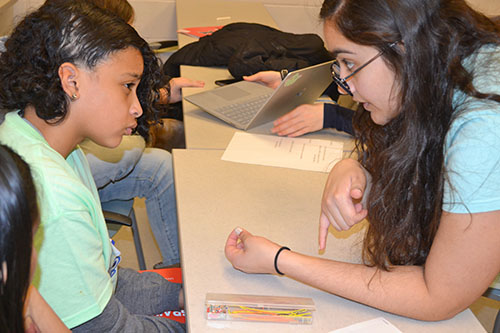 An Illinois engineering student (right), explains some electrical engineering principles to an Engineering Exploration participant.
An Illinois engineering student (right), explains some electrical engineering principles to an Engineering Exploration participant.One final piece of advice: “Never ever give up. People will make you feel like you can't do it, or you'll feel like you can't do it, and just trust me. I'm sure all of us have been there at some point, and you will probably feel that way at some point. But don't ever give up in whatever you decide to do, whether it's engineering or something else. You can do it. I totally promise we were all right here in your seat, and it's totally doable, and yeah, you guys are going to be awesome!”
Many of the volunteers who helped with the activities did so to give back, and because similar events had impacted them as children. For instance, Mickey, an Electrical Engineering senior, set to graduate next December, and SWE’s co-director of outreach last year, shares why she got involved in Engineering Exploration. “I held a lot of the big events last year, so I definitely like to come back and help out,” she says, adding that now, her role is “just a little less chaotic.” She shares why participating in outreach is important to her. “I'm doing outreach a lot because when I was younger, my mom would take me to events like this.” She recalls going to events in the Chicago area and also here at Illinois, such as GAMES camp when in middle school and also when in high school. “So I owe a lot of my engineering drive to doing that when I was younger,” she acknowledges.
Did coming to engineering camps when younger clinch whether engineering was the career for her? “For sure,” she agrees. She admits that when she was younger, she didn’t know women could be engineers, because she hadn’t really seen any female engineers. “Whenever engineers were depicted in movies or anything, they'd always be men. So it was hard for me to see myself as someone doing engineering, ‘cause I was just, ‘Well, I'm probably delegated to a humanities career.’ But definitely coming here and being, ‘Wow! All these women are happy and doing well, and they all have internships and full time offers: I can't believe that. I can be something like that!’”
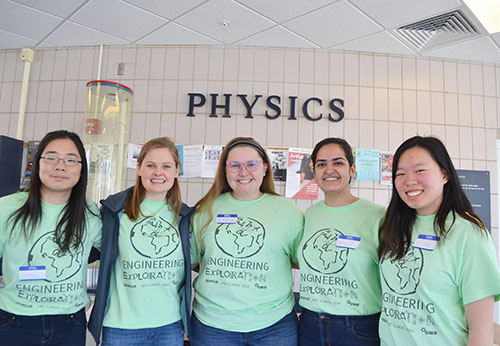
SWE leaders who organized and ran the event, including Kylie Burkett, Saloni Nagarkar, and Lilian Wang.
Lilian Wang, a freshman in computer engineering and one of the chairs for the event, also hoped to expose kids to the kids of activities she experienced as a youngster. She shares her goal for the day: “I hope to teach girls more about engineering and what it actually is, because when I was their age, I really had no clue. I thought it was just building stuff. All I really knew about was mechanical engineering when I was their age. So I really hope that they get more exposure to the different aspects of engineering.
Similarly, Kylie Burkett hopes to inform the girls that engineering is a great career option. She recalls that when she was their age, if you had asked her what she wanted to be, she would have said a doctor or a lawyer…or a professional softball player. “That didn't work out, obviously,” she wisecracks. “So just letting them know the different career paths they have. And we've gotten a lot of good feedback already from parents that are just happy that they can come to this.”
Burkett’s hope for the day? “My hope is that we inspire the next generation. I say that almost every time, but that's my motto—inspiring them. Just letting them know, “Hey, we can do it; you can do it. And if you don't know that you want to go into engineering, maybe this will help you.”
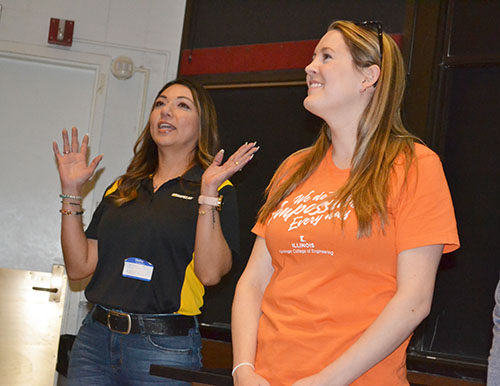
Jessica Anderson (left), an engineer at Caterpillar, shares with the audience about her experiences as a female engineer.
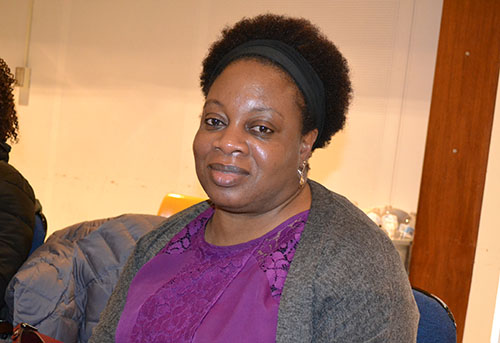
Chinyere Onyemere, a mother who brought her to Engineering Exporation to pique her daughter's interest in STEM.
For some of the mothers present, they too hoped to show their daughters that engineering is a viable career option. For instance, one of the presenters, Jessica Anderson, got permission to bring her 10 and 11 year-old daughters to the event, although it was targeting middle school girls. She was excited that her fourth and fifth graders were getting to participate. “So I liked the idea because they can be exposed to these types of activities.”
Of course, like Mom, both are interested in STEM or engineering. The youngest wants to be a NASA engineer…maybe an astronaut. Her oldest is into biology, animal science, or ecology.
Regarding what she hoped the two would get out of the event, she reports: “The mentality that they are going to college,” which she’s been emphasizing since they were little. Another idea she hoped they’d pick up at the event was that “They can be an engineer,” and that it isn’t too hard for them. She feels another benefit is their being exposed to women in engineering: “coming into the college and seeing other girls around…I want it to be something that is expected…that is normal.”
Another mother, Chinyere Onyemere, indicates that she brought her 11-year-old daughter to the SWE event because the youngster isn’t necessarily interested in science or STEM. “That's why I brought her here,” she reports. “I'm hoping to open up her interests some more.”
The emphasis of the day that sounded intriguing to Onyemere was “having the opportunity to explore the options for females in engineering.” Given that the event targeted females, she says, “I thought that was a good thing for her, rather than the general, you know, where the boys or the girls are involved…I thought it would be good when she sees other females, like the panel, that will probably spike her interest a bit more.”
Emily Schubert, a mother from Naperville, Illinois, brought her daughter, Lorraine, a 12-year-old, who’s in sixth grade, and is interested in engineering—like her dad. (Dad, who trained as a mechanical engineer at Illinois, currently works with control systems for large semi-trucks at Caterpillar’s rival, Navistar (International Harvester.) According to Mom, Lorraine’s favorite subject is math. But Schubert says “If you ask her, it might be something a little different. I know she really enjoys her electives, like orchestra, and design and modeling.” (Of course, design and modeling are very engineering.)
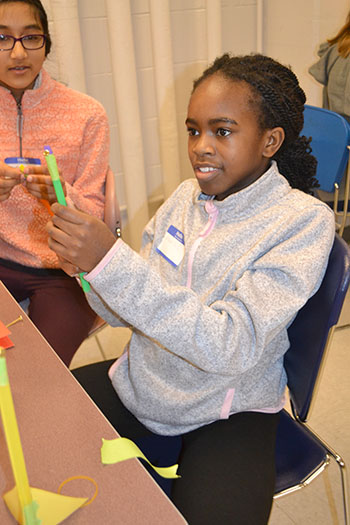
A young participant works on her Slingshot Straw Rocket during the Mechanical Engineering activity led by Off-Road Illini Baja.
Schubert’s hope for the event was that Lorraine would find out more about the opportunities inherent in engineering. “You hear engineering, and you think automatically, it's gotta be all math and science. But just even sitting down and having the presenters today go over, ‘Look, these are all of the different types of engineering fields that there are, that you can go into,’ I hope she gets a better understanding that it isn't all just math and science. So hopefully she'll find something that piques her interest.”
Story and photographs by Elizabeth Innes, Communications Specialist, I-STEM Education Initiative.
More: 6-8 Outreach, 8-12 Outreach, Engineering, Society of Women Engineers, Women in STEM, 2020
For additional I-STEM web articles about SWE and its outreach events, see:
- Middle School Girls Discover Engineering Is Fun During SWE’s Round Robin
- SWE's Rockin' Engineering Round Robin Tells Girls: "You Can Be An Engineer and Still Be Yourself!"
- SWE's "Save the World With Engineering" Outreach Targets Middle School Girls
- Introduce-a-Girl-to-Engineering Day Tells Girls: "You Can Be an Engineer, Change the World!”
- Mommy, Me, and SWE Strives to Convince Girls That They Can Be Engineers Too
- Leal Kindergarteners Are “Engineers-in-Training” Thanks to SWE’s FKO Outreach
- SWE Outreach Seeks to Interest Kids in Engineering and Say, “You Can Do It Too!”
- SWE: A Support System for Illinois' Female Engineering Students
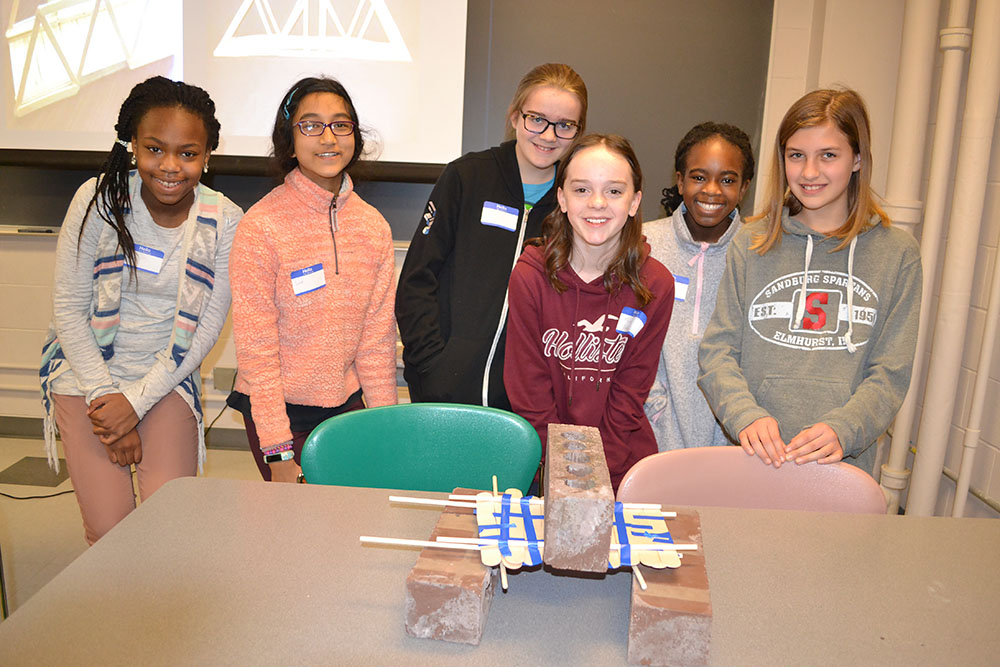
A team of participants by the bridge they designed during the civil engineering session, which is successfully passing the brick test.
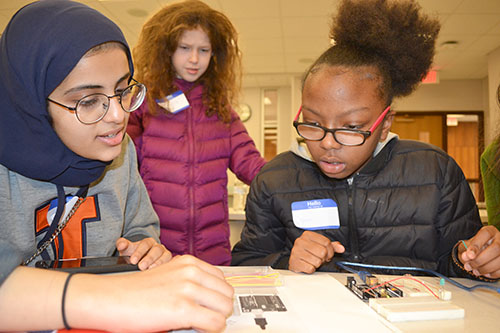
An Illinois Engineering student (left) works with a youngster on the Electrical/Computer Engineering hands-on activity.
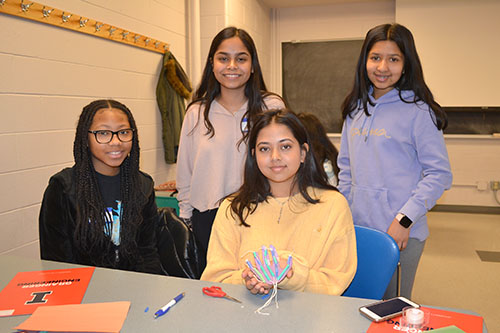 A group of girls show off the the Prosthetic Hand they designed during the Bioengineering hands-on activity.
A group of girls show off the the Prosthetic Hand they designed during the Bioengineering hands-on activity.













.jpg)
















